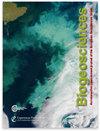Enhanced Southern Ocean CO2 outgassing as a result of stronger and poleward shifted southern hemispheric westerlies
IF 3.9
2区 地球科学
Q1 ECOLOGY
引用次数: 1
Abstract
Abstract. While the Southern Ocean (SO) provides the largest oceanic sink of carbon, some observational studies have suggested that the SO total CO2 (tCO2) uptake exhibited large (∼ 0.3 GtC yr−1) decadal-scale variability over the last 30 years, with a similar SO tCO2 uptake in 2016 as in the early 1990s. Here, using an eddy-rich ocean, sea-ice, carbon cycle model, with a nominal resolution of 0.1∘, we explore the changes in total, natural and anthropogenic SO CO2 fluxes over the period 1980–2021 and the processes leading to the CO2 flux variability. The simulated tCO2 flux exhibits decadal-scale variability with an amplitude of ∼ 0.1 GtC yr−1 globally in phase with observations. Notably, two stagnations in tCO2 uptake are simulated: between 1982 and 2000, and between 2003 and 2011, while re-invigorations are simulated between 2000 and 2003, as well as since 2012. This decadal-scale variability is primarily due to changes in natural CO2 (nCO2) fluxes south of the polar front associated with variability in the Southern Annular Mode (SAM). Positive phases of the SAM, i.e. stronger and poleward shifted southern hemispheric (SH) westerlies, lead to enhanced SO nCO2 outgassing due to higher surface natural dissolved inorganic carbon (DIC) brought about by a combination of Ekman-driven vertical advection and DIC diffusion at the base of the mixed layer. The pattern of the CO2 flux anomalies indicate a dominant control of the interaction between the mean flow south of the polar front and the main topographic features. While positive phases of the SAM also lead to enhanced anthropogenic CO2 (aCO2) uptake south of the polar front, the amplitude of the changes in aCO2 fluxes is only 25 % of the changes in nCO2 fluxes. Due to the larger nCO2 outgassing compared to aCO2 uptake as the SH westerlies strengthen and shift poleward, the SO tCO2 uptake capability thus reduced since 1980 in response to the shift towards positive phases of the SAM. Our results indicate that, even in an eddy-rich ocean model, a strengthening and/or poleward shift of the SH westerlies enhance CO2 outgassing. The projected poleward strengthening of the SH westerlies over the coming century will, thus, reduce the capability of the SO to mitigate the increase in atmospheric CO2.由于更强的南半球西风带向极地移动,南大洋的二氧化碳排放增加
摘要虽然南大洋(SO)提供了最大的海洋碳汇,但一些观测研究表明,在过去30年里,南大洋总CO2 (tCO2)吸收量表现出较大的年代际变化(~ 0.3 GtC), 2016年的sotco2吸收量与20世纪90年代初相似。在这里,我们使用一个名义分辨率为0.1°的富含涡流的海洋、海冰、碳循环模型,探讨了1980-2021年间总SO - CO2通量、自然和人为SO - CO2通量的变化,以及导致CO2通量变率的过程。模拟的tCO2通量在全球范围内与观测值相一致,显示出年代际尺度的变异,振幅为~ 0.1 GtC yr - 1。值得注意的是,模拟了两次二氧化碳吸收的停滞期:1982年至2000年和2003年至2011年,而模拟了2000年至2003年以及2012年以来的复苏。这种年代际变率主要是由于与南环模变率相关的极锋以南自然CO2通量的变化。由于ekman驱动的垂直平流和混合层底部的DIC扩散联合带来了表面天然溶解无机碳(DIC)的增加,SAM的正相位,即更强且向极地移动的南半球西风带,导致SO nCO2放出增强。CO2通量异常模式表明,极锋以南的平均气流与主要地形特征之间的相互作用是主要控制因素。虽然副风的正相位也导致极锋以南人为CO2 (aCO2)吸收增强,但aCO2通量的变化幅度仅为nCO2通量变化的25%。由于随着SH西风带增强和向极地移动,与aCO2吸收相比,nCO2释放量更大,因此自1980年以来,SO tCO2吸收能力随着SAM向正相位的转变而降低。我们的结果表明,即使在一个漩涡丰富的海洋模式中,SH西风带的加强和/或向极地移动也会增强二氧化碳的释放。因此,在未来的一个世纪里,预估的西南西风带向极地加强将会降低SO减缓大气CO2增加的能力。
本文章由计算机程序翻译,如有差异,请以英文原文为准。
求助全文
约1分钟内获得全文
求助全文
来源期刊

Biogeosciences
环境科学-地球科学综合
CiteScore
8.60
自引率
8.20%
发文量
258
审稿时长
4.2 months
期刊介绍:
Biogeosciences (BG) is an international scientific journal dedicated to the publication and discussion of research articles, short communications and review papers on all aspects of the interactions between the biological, chemical and physical processes in terrestrial or extraterrestrial life with the geosphere, hydrosphere and atmosphere. The objective of the journal is to cut across the boundaries of established sciences and achieve an interdisciplinary view of these interactions. Experimental, conceptual and modelling approaches are welcome.
 求助内容:
求助内容: 应助结果提醒方式:
应助结果提醒方式:


